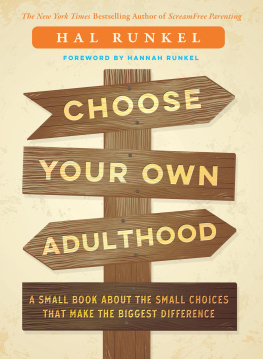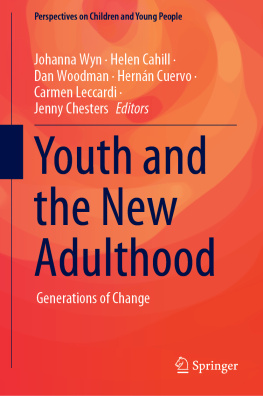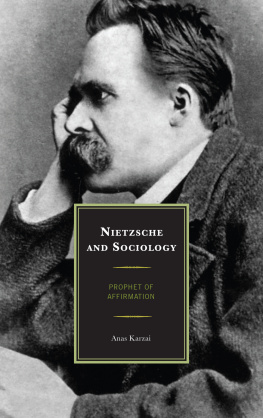First published in 2007 by
Berghahn Books
www.berghahnbooks.com
2007, 2009 Harry Blatterer
First paperback edition published in 2009
First ebook edition published in 2012
All rights reserved.
Except for the quotation of short passages
for the purposes of criticism and review, no part of this book
may be reproduced in any form or by any means, electronic or
mechanical, including photocopying, recording, or any information
storage and retrieval system now known or to be invented,
without written permission of the publisher.
Library of Congress Cataloging-in-Publication Data
Blatterer, Harry.
/ Harry Blatterer.
p. cm.
Includes bibliographical references and index.
ISBN 1845452852 (hardback : alk. paper) -- 978-1-84545-628-3 (paperback : alk. paper) -- 978-0-85745-531-4 (ebook) 1. Adulthood. 2. Social role. 3. Life cycle, Human. I. Title.
HQ799.95.B56 2007
305.2409172'2DC22 2006036156
British Library Cataloguing in Publication Data
A catalogue record for this book is available from the British Library
ISBN: 978-1-84545-285-8 hardback, 978-1-84545-628-3 paperback, 978-0-85745-531-4 ebook
PREFACE
Peter Beilharz
The new individualism presents itself to us as a serious problem, and challenge. The main reason for this is obvious. There does seem to be a weakening of ties, a corrosion of loyalty, an acceleration of time, an increasing emphasis on looking out for number one. Sometimes this care still extends to looking after a family, but now the idea of the family is also increasingly uncertain, open to dissolution and renewal. If I can make my family anew, at short notice, then there is really only me, the individual, as a core unit or reality.
Leading intellectual trends such as communitarianism and critical theory have staked a claim to blowing the whistle on these trends. They have long identified surplus individualism, or narcissism, as a major problem in the West. Perhaps this was best brought out into the sixties, by the me-generation and its chronic self-absorption, self-obsession. This line of criticism was confirmed by writers like Lasch and Sennett in the US, and later by Bauman in Europe. Here the markers are apparent. There seems to be a loss of telos, or project, for many ordinary citizens in everyday life. The moment becomes all consuming, and immediate gratification becomes overwhelming. Huxley warned us about this is Brave New World in 1932 already. Changed conceptions of time would lead to reduced or diminished social commitments. Prolonged adolescence would bring with it postponed adulthood. Nobody seems to want to grow up any more, especially not the young.
Yet we behave like children, us adults too. Perhaps it is rather the case that the me-generation never stopped, just kept expanding. From a properly sociological perspective, it now seems that there was a Golden Age life coursea pattern of habits and expectations unique to the period of the postwar boom. Here there was a standard life-course, standardized expectations for men, women, and children, one size fits all, and these senses expanded conceptually until we had normalized them. Certainly one historically unique aspect of the postwar period was the expansion of youth and youth culture; and this is why we need today to match the idea of new individualism with that of new adults.
Communitarianism and critical theory are always open to the criticism of nostalgia, and this indeed is legitimate. For these are intellectual traditions whose purpose is the critique of modernity, and with it the critique of the idea of progress. Yet constant vigilance is also called for here; we cannot simply presume that it was always better in the past, and in fact most of us do not believe this in terms of our everyday sensibilities and dispositions.
Harry Blatterer's contribution in this book is brilliantly to work this interface between radical critique of the present and affirmation of its actually existing contents. This brilliant book is an invitation to contemplation and conversation, not least between us, close to middle age, and our children, our students. It is elegant, beautifully written, engaging, reflexive, an exemplary sociology of everyday life.
Blatterer starts from the premise that adulthood is an invisible concept, or norm, like whiteness. We know that maturity is difficult, not least in the academy, or anywhere where academic professionalization means that the prospect of autonomy or recognition comes late. Youth is a brilliant theme, deeply connected to romanticism and to Enlightenment.
Do we ever grow up? We do not grow, perhaps; we learn (perhaps). We struggle, and it is this that makes us what we are. The image of standard adulthood is nevertheless normalized after World War II, after the postwar boom. This is a symptom of Fordism, set roles, Levittown, or Elizabeth in Adelaide or any new suburbs in Australia or anywhere else in the suburban worldmalls rule. Fordism is then frozen as a successful normative regime; but the world keeps moving. The notion of telos or transition is arguably normalized earlier, but it is less transition than movement which is fundamental. The norm of adulthood therefore corresponds to high modernity, or in theory to modernization theory. The problem now is not that society is postmodern, but rather that it is truly modern, i.e. innerly and always mobile. Here it is the presently dominant generationus which is transitional. Our children are ahead of us. Our children are therefore more modern than us, who are fixed to solid modern claims. They are therefore more challenged than us by the necessity and difficulty of choice. For them, the challenge is even harderthe image of society and subject without limits, including self limits, the simultaneous sense that I can and should be everything and yet that all this is elusive.
In all this, this book is neatly and powerfully sociological; the point is not that our children are lost, it is that if we were now in our twenties, we would respond to this world in the same ways as them. The process of change, contrary to public and scholarly misconception, is therefore both historical and sociological, rather than generational. The new generation is a carrier, as much as a leader (or follower). Nevertheless, the image of the biography, path, Lebenslauf pervades even in a postvocational society. Sociologically speaking, we are plainly not only after Weber, but also after Habermas.
The power and precision of insight involved in all this is incredible, as abundantly manifest not least in the case studies developed and so well interpreted here. In fact, the book gets better as it proceeds. Adulthood is now reconsidered as personhood, and we step to recognition. The maturity and balance here is remarkable, calm, reflective, but poignant. Then we turn to youth (and implicitly to beauty, to narcissism). The analysis of paths of youth and class are brilliant. Enter the teen, the rebel, the counterculture. Now the judgement becomes wise, be young until you die, youth as the ideology for life. This affects all of us, aging hippies no less than others.








